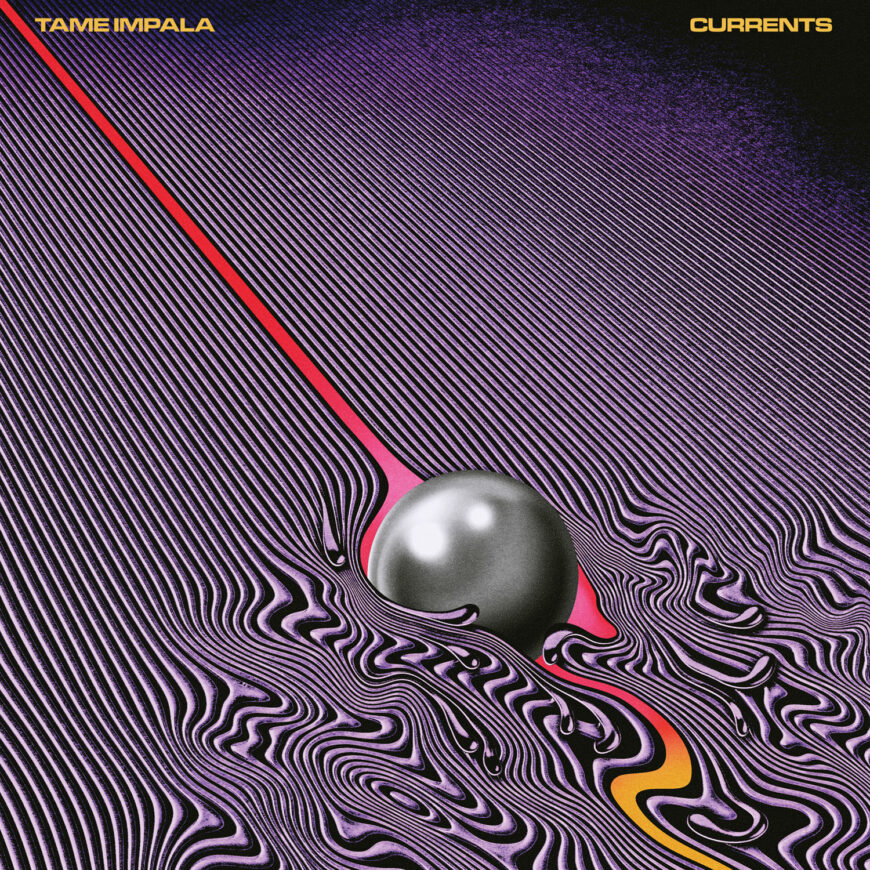At first, Kevin Parker seemed to have emerged from another era. On Tame Impala’s earliest recordings, Parker expertly evoked the sound of soaring ‘60s psychedelic rock. He leaned into a vintage aesthetic and somehow made it feel fresh — fresher, even, than some of the more forward-thinking music that was being served up by their psychedelic peers at the time. On Tame’s 2010 debut InnerSpeaker, the Perth-area studio rat and his bandmates — this was before he started calling Tame Impala his solo project — were a traditionalist’s dream, channeling Hendrix, Blue Cheer, and the Beatles in kaleidoscopic pop songs that never forgot to rock.
By the time Currents arrived 10 years ago today, Parker had revealed himself to be very much a creature of his own day and age. In part, this was because he had become one of the chief architects of that musical moment, sparking countless imitators within the bustling 2010s psych-pop scene. But if the world of streaming-friendly, festival-ready “indie” music was bending toward him, he was also adapting to that environment’s demands. Or at least he was letting his muse carry him to songs that just happened to thrive at Coachella, informed not only by Parker’s psych heroes but the funkiest R&B, the gaudiest EDM, the most luxuriant soft rock. It was right there in the text, from “Let It Happen” to “Yes, I’m Changing” to “New Person, Same Old Mistakes,” but you didn’t need to know English to grasp the reinvention that was taking place.
The evolution had begun with Lonerism, the 2012 masterpiece on which Parker nudged his fuzzed-out guitar jams into the realm of electronic dance music, in ethos at least. As Ian Cohen put it at the time, “Kevin Parker doesn’t sound like an electronic producer, he just thinks like one.” Infusing his music with subtle electronic elements and assembling it like a DJ ready to rock the Sahara Tent, Parker ended up with a stack of prismatic pop-rock epics that I have often compared to video game levels — holographic yet hard-hitting, deeply layered but agile as, uh, an impala. Like InnerSpeaker, it was a paean to insularity, but it sounded just as phenomenal in a field full of people as it did on headphones.
In the years after Lonerism, Tame Impala blew up to an extent that has become extremely rare for underground rock bands. Parker toured the world, bringing his band to plenty of genre-jumbling festivals along the way, picking up the tricks of the trade by osmosis. He entered the world of guest rappers and Hollywood tie-ins, releasing a version of “Feels Like We Only Go Backwards” with a Kendrick Lamar verse for the Divergent soundtrack. He also made some songs with Mark Ronson, learning from the approach of a DJ who wasn’t restrained by the same hang-ups about what’s allowed. “He comes from that world of sampling music,” Parker told me backstage at a Tame Impala show in 2015. “So I guess for him, it doesn’t matter where something comes from. I guess it just matters that what comes out of the other end is cool and feels good, basically.”
In that conversation, Parker rejected my assertion that Currents was designed to flourish at festivals: “Don’t say that. That’s terrible.” He said he’d learned early on how easy it is to get people jumping up and down by pandering to their basest impulses, and he wasn’t interested in providing those kinds of cheap thrills. Instead, for Parker, Currents was about chasing what feels good even when his ingrained biases were screaming at him to turn back: “being able to play that sound and just dive down that rabbit hole and just see where it takes you, see where you end up, see what the other side looks like.” On one level, it was a breakup album in the classic sense; many songs read like postmortems on Parker’s romance with fellow psych adventurer Melody Prochet of Melody’s Echo Chamber. But in another sense, it was the sound of this guy breaking up with an older, more restrictive version of himself, letting go of his presuppositions and indulging in true creative freedom for the first time.
“Let It Happen” is the thesis statement, the EDM-infused anthem about ceasing to hold back what’s inside anymore, and damn if it doesn’t sound exactly like leaping into the unknown. From its sweeping grandeur to its lysergic, Lennon-esque vocal melodies, Currents’ opening track and lead single was unmistakably Tame Impala. Yet by the time those laser-light-show synths kicked in after the second chorus, dancing atop the mix as if conducted by God himself, it was clear this was the sound of Parker plunging into a new reality. If I went to a Tame Impala show and they skipped “Let It Happen,” I’d be irate. It feels like the project’s crowning achievement, still as exhilarating today as it was upon impact in March 2015, when it heralded the dawn of the Currents era.
Can the same be said about Currents as a whole? I haven’t always felt that way over the past decade. In that 2015 feature about the album, I raved, “Tame Impala’s music has always been transportive, but Currents truly sounds like nothing else.” But I laughed upon re-reading that yesterday because at some point everything else started to sound like Currents. Imitators proliferated, many with only a fraction of Parker’s musical dynamism, and somehow all of them ended up on satellite radio playlists and in streaming autoplay queues. Even the tracks from Currents itself suffered from overexposure as they became a default soundtrack for chic coffee shops, luxury car commercials, and overpriced fashion boutiques.
In the long gaps between tentpole releases, Parker himself put out plenty of lesser variations on the nouveau Tame Impala sound, often watered down to an extent he would never allow on a canonical LP, and he supplied his steez to seemingly any pop or rap star who inquired. Some A-list stars who didn’t work with Parker seemed to be channeling him anyway, like Post Malone, who, between his hip-hop and country eras, further smoothed out Tame Impala’s elevated adult contemporary bangers into vibey post-genre muzak. Currents became so ubiquitous and influential that at some point it stopped feeling like a bold new frontier in psychedelic pop and started feeling like a trip to Chipotle. It doesn’t help that the early guitar jams crush onstage in a way many of the newer songs simply cannot. In cranky moments, it can be easy to write off this album as the lodestar for everything wrong with rock music over the past 10 years.
But sometimes the context can drown out the actual music, and in this case I’m ready to declare Kevin Parker innocent. When I lock in and engage with Currents again on its own terms, buddy, this album still kicks ass. The bass on every track is out-of-control catchy while grooving ridiculously hard — never more so than on the dryly funny “The Less I Know The Better,” which, at two billion Spotify streams and counting, has become the band’s signature hit, to the dismay of Trevors everywhere. The album’s drums, live and programmed alike, never lose their put-together crispness even when they break out into bombastic fills, like the ones that tumble violently through the roller-rink disco dream world of “Reality In Motion.” The expanded use of synths brought Tame Impala into a new dimension, filling out the arrangements with bright hooks and lush textures unlike anything previously in the band’s arsenal. When all those elements aligned just so, as on the infectious shuffle “The Moment,” it could feel like the entirety of 21st century psych-pop, from the Flaming Lips to Caribou to MGMT to chillwave, was leading up to this.
For all its dreamy, woozy, poppy qualities — and all their attendant appeal — Currents is still at its best when it’s hitting hard. Rihanna may disagree, but give me the urgent rush of “Let It Happen” over the hallucinatory float of “New Person, Same Old Mistakes” any day. That rubric holds across the rest of the tracklist; the songs that inspire involuntary physical movement are superior to the mood pieces that waft across the stereo like neon vapor, even if both are essential to the fabric of circa-2015 Tame Impala. Parker followed his instincts to an equilibrium in which tracks like the intentionally chintzy two-minute ditty “Disciples,” the trap-adjacent dream-pop slow-drift “Love/Paranoia,” and the swooning IMAX blue-eyed soul of “Cause I’m A Man” held each other in balance. Each subtly different iteration of the Currents aesthetic was fit for zoned-out scrolling or hitting the vape pen and studying the music’s many marvelous contours — yet first and foremost they are pop songs, with all the infectious hooks and beats the description implies. These tracks work because they have oomph.
My personal favorite remains “Eventually,” a power ballad wherein the power and the balladry are constantly upping the ante on each other. The verses are so aerodynamic that they seem to defy gravity, even more so at the end when that strobing keyboard line comes along to illuminate the song like a disco ball. A solitary finger-snap leads into a chorus that feels like it’s spotlit by a UFO — a setting fit for a supernatural slow dance, instead deployed to assure your lover that the two of you will be happier apart. I can imagine Max Martin bowing down in awe at the arching hook Parker attaches to the word “eventually” (and the wordless melody that answers it). Best of all, those depth-charge chords that come crashing down in strategic moments lend the song a blown-out heft, as if Sleater-Kinney’s The Woods is trying to rip a hole in space-time and barge belligerently into prom.
Ultimately, Currents carried Tame Impala to somewhere near the center of the popular music universe, or at least the version of popular music that (with all apologies to Kevin Parker) animates the modern music festival landscape. When I streamed the album the other day, the artists the algorithm served up afterward were a telling mix: Radiohead, Real Estate, and Phoenix, but also the Weeknd, Travis Scott, and Tyler, The Creator featuring Frank Ocean. Parker wasn’t quite a pop star, but he was navigating the new prestige mainstream as deftly as any psychedelic rocker could have at a moment when big tech was wreaking havoc on the indie music ecosystem, the tectonic plates of genre were shifting, and rock was retreating ever farther from the zeitgeist. “There is a world out there that’s calling my name,” he croons on “Yes, I’m Changing.” With Currents, Tame Impala met that world head-on.








